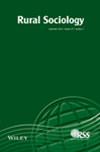“Long‐Term Temporary” Disaster Recovery Housing: Living in RVs Post‐Wildfire
IF 1.9
3区 社会学
Q2 SOCIOLOGY
引用次数: 0
Abstract
Sociological research has begun to examine how individuals and communities stabilize, recover, and rebuild post‐disaster, highlighting the importance of housing through the broader recovery process, which often takes multiple years. Wildfire impacts and losses have been increasingly studied by sociologists, but the recovery process has not been well examined in the rural context. This article builds on the nexus of housing, rural, and disaster recovery scholarship to explore the use of recreational vehicles (RVs) as an informal, post‐disaster housing strategy. Using qualitative research conducted with a rural community in Oregon post‐wildfire, we explain why residents choose RVs and what the experience is like for them. Although RV living is affordable and bolsters long‐time place‐based and RV community connections, it also exacerbates pre‐fire vulnerabilities and creates new sources of hardship and stress. RVs may function as a quick coping strategy for post‐disaster housing and reflect rural self‐reliance and community resilience, but we argue they are also a source of future disaster vulnerability that requires institutional intervention.“长期临时”灾难恢复住房:居住在野火后的房车中
社会学研究已经开始研究个人和社区如何在灾后稳定、恢复和重建,强调住房在更广泛的恢复过程中的重要性,这通常需要数年时间。社会学家对野火的影响和损失进行了越来越多的研究,但在农村环境下,恢复过程还没有得到很好的研究。本文以住房、农村和灾后恢复奖学金的关系为基础,探讨休闲车(rv)作为一种非正式的灾后住房策略的使用。通过对俄勒冈州一个乡村社区进行的定性研究,我们解释了居民选择房车的原因以及他们的体验。虽然房车生活是负担得起的,并加强了长期的基于地点和房车社区的联系,但它也加剧了火灾前的脆弱性,并创造了新的困难和压力来源。房车可以作为灾后住房的快速应对策略,反映农村的自力更生和社区的复原力,但我们认为它们也是未来灾害脆弱性的一个来源,需要制度干预。
本文章由计算机程序翻译,如有差异,请以英文原文为准。
求助全文
约1分钟内获得全文
求助全文
来源期刊

RURAL SOCIOLOGY
SOCIOLOGY-
CiteScore
4.60
自引率
13.00%
发文量
47
期刊介绍:
A forum for cutting-edge research, Rural Sociology explores sociological and interdisciplinary approaches to emerging social issues and new approaches to recurring social issues affecting rural people and places. The journal is particularly interested in advancing sociological theory and welcomes the use of a wide range of social science methodologies. Manuscripts that use a sociological perspective to address the effects of local and global systems on rural people and places, rural community revitalization, rural demographic changes, rural poverty, natural resource allocations, the environment, food and agricultural systems, and related topics from all regions of the world are welcome. Rural Sociology also accepts papers that significantly advance the measurement of key sociological concepts or provide well-documented critical analysis of one or more theories as these measures and analyses are related to rural sociology.
 求助内容:
求助内容: 应助结果提醒方式:
应助结果提醒方式:


